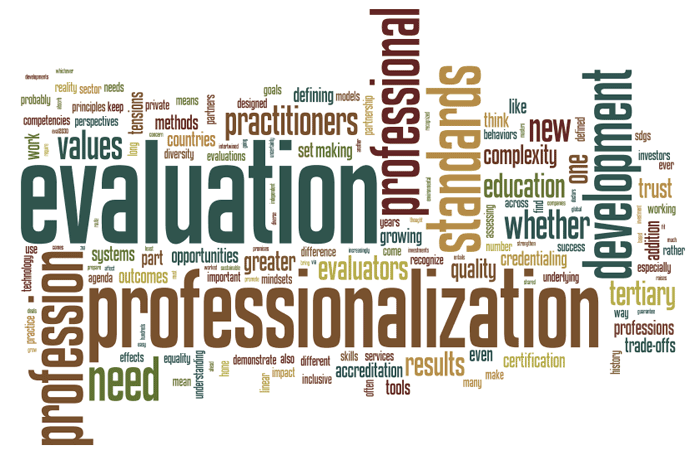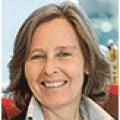Professionalization With a View to Eval2030
Are we ready, will we ever be? The conversation about professionalization in evaluation has a long history, and often raises much concern and interest. Over the 25 years that I have spent working in evaluation, there have been moments when I thought "haven't we discussed enough?" but come to think of it: many other professions took hundreds of years to shape their professional standards.

Professional Standards
Generally, we don't even think twice whether professional standards should exist. From carpenters to doctors and lawyers, professions have established principles and standards that aim to guarantee clients a certain quality of services. Professional standards are designed to create trust in the profession. Professionalization – recognizing individual practitioners as fit to abide by these standards – is a means to establish the same trust in recognized practitioners.
As we discuss professionalization, it is important to keep these principles and intended outcomes in mind: high quality of services, trust in the profession and the practitioners, and subsequent use and impact of evaluations. Whatever mechanisms for professionalization we put in place, they need to deliver these outcomes: higher quality evaluations and greater consistency in quality across the profession as the first tier, sustained trust in the evaluation profession as the second, and demonstrated influence on better informed decision making as the third.
Any investment in professionalization, whether in the form of accreditation, credentialing, and certification, or formal tertiary education, needs to yield these results.
In a number of countries, tertiary education has taken off to integrate evaluation in its course work. More and more graduates have masters and PhDs in evaluation. This is an exciting development! It is growing a different cadre of evaluation professionals. Evaluation capacity development should support investments in tertiary education systems, especially in partner countries. In addition, efforts should be made to network faculties that teach development evaluation to arrive at a shared understanding of competencies and skills that evaluators need. This would strengthen the global evaluation profession and practice, which is particularly relevant for development practitioners who work across borders.
Accreditation, Credentialing and Certification
In addition, accreditation, credentialing and certification, have been developed in a number of countries and regions. This has happened in recognition that it would take some time before professional standards will evolve through tertiary education. One does not exclude the other and each of you can probably think of professions where they complement each other. It is a way to get to professionalization ahead of the more time-consuming route via tertiary education. But, questions have come up whether and which parts of accreditation, credentialing, and certification produce the desired results of professionalization, and at what costs.
Whichever avenue professionalization takes, it is important that it is able to prepare evaluators for the future. A new agenda has been set for 2030. It provides opportunities to grow the evaluation practice, and with it the profession. Professionalization needs to incentivize rather than stifle the growth of the profession.
The new development agenda – the Sustainable Development Goals (SDGs) – provide opportunities not just to hone evaluation methods and explore new techniques. They have underlying implications for the professionalization of evaluation. Let me expand with a few examples that I find most interesting but also most challenging.
Challenging Underlying Implications
Complexity. Evaluation has been intertwined with linear models like theory of change, logical frameworks, and the like. These tools were designed for clarity about how an intervention achieves its results. In that they simplified reality, albeit with provisions for risks and assumptions that could capture uncertainty, unintended effects, etc. Unfortunately, as many of us know these tools have not worked well, and least of all this part that deals with the complexity of real development situations. Going forward, complexity is part of our life, and mindsets and methods of evaluators will need to match that reality. For professionalization it means we need to codify professional standards that correspond to complexity rather than linear models.
Values. Development and evaluation often contain intrinsic values. The SDGs suggest a more inclusive world that "leaves no-one behind" and promises greater equality. They also recognize that these goals need even greater partnership, and partners mean that different perspectives are at work. The question, therefore, must be asked whether inclusion or equality is defined as one development model based on one value system, or does inclusive development mean greater diversity. One way or another, as evaluators we need to hone our mindsets and tools for this challenge, whether it is to evaluate the effects of underlying values on outcomes and performance, or on our yardstick for assessing results. What does that have to do with professionalization? Professional standards may be defined rigidly and rooted in one set of values, or as competencies to recognize diverse values and understand how they affect evaluation design, conduct and results.
Private sector and partnerships. In addition to the diversity of values and perspectives, working in partnership requires defining what success looks like. New frontiers that are evolving in the private sector to increase their social and environmental footprint, whether from big companies and institutional investors to more personalized impact investors. These partners bring new methods, technology, and language to the table. The opportunities for growing the profession are incredible, especially when it comes to technology that can help us become nimbler and more efficient in pulling together evidence. But, the ever growing "tent" of evaluation practitioners will probably make it even harder to agree on commonly agreed professional standards. Professionalization entails defining who is included in the profession and who is not. But, these boundaries need to be dynamic to absorb new developments to keep the profession at the cutting edge.
Tensions and trade-offs. All three of these challenges encapsulate tensions and trade-offs. In some instances, professional standards find easy solutions. In others, professionalization of evaluation will require making "holding of tensions" and assessing trade-offs as part of professional competences that evaluators need to demonstrate.
Making a difference. Finally, evaluation practitioners are increasingly called upon to demonstrate what difference we make. As a profession, we have a long history that involves the use of evaluation and follow-up systems. The next frontier lies in understanding the kinds of behaviors evaluation incentivizes. These are institution-specific and need to define how self- and independent evaluation systems are set up. In terms of professionalization, defining professional standards that promote these skills and behaviors will be essential to our long-term success.
This post was originally published on the blog page of the Independent Evaluation Group (IEG) of the World Bank, and has been re-posted with the permission of the original author, being Caroline Heider, Director General of the IEG. The original blog post can be accessed here.



